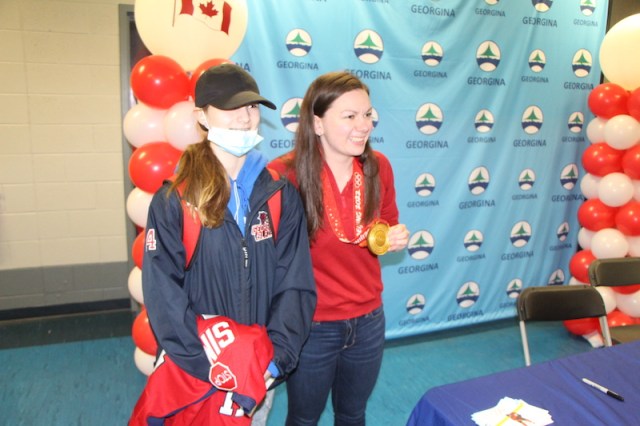By Mike Anderson
Fresh from her hockey team’s gold medal win against team U.S.A. at the Winter Olympics in Beijing, Erin Ambrose, who grew up in Keswick playing for the Georgina Blaze, was the guest of honour at the Ice Palace on April 3.
With the Town proclaiming it Erin Ambrose day, more than a hundred adoring fans, including dozens of girls who play on local hockey teams, showed up to get an autograph and a selfie with their Olympic hero and her gold medal.
Mayor Margaret Quirk and local dignitaries, including York-Simcoe MPP Caroline Mulroney and MP Scot Davidson, were also on hand to give Ambrose a hometown welcome, and there was a free public skate in her honour.
Taylor Filby, 16, and Emma Bernier, 18, were among several girls who made it up to the podium, thanking Ambrose for inspiring them and presenting her with a team hoodie.
Taylor said their team, the Golden Hawks, was having trouble signing up enough girls to play, but that all changed during the Olympics, with Ambrose scoring four goals, the most by a defensive player during the tournament.
“I don’t want to stereotype, but hockey is thought of as a boy’s sport and seeing a girl like Erin grow up in Georgina and succeed shows girls they can too,” Taylor said.
“It shows us not to give up because Erin started where we all started, and now she’s winning gold medals in the Olympics,” added Emma, who also dreams about playing in the Olympics.



“It was heartwarming; I haven’t been back in Keswick in a while, and to see all the people there was incredible,’ said Ambrose, who was taken aback by the size of the crowd.
She was especially pleased to see so many young girls come out to the event, including girls that don’t play hockey.
That’s important because Ambrose wants to encourage more girls to participate in sports.
“The amount of girls that drop out of sports by the age of 16 is way too high,” she said.
“We need to show young females how life-changing sports can be, not just hockey, but any athletic sport.”
“It just makes such a difference in all facets of life. So making it more accessible to all is an important thing.”
According to a recent national study on sports participation for Canadian girls aged 6 to 18, participation levels for girls are much lower than for boys.
And among girls who participate in sports, 1 in 3 leave sports after late adolescence, whereas the dropout rate for teenage boys (aged 16-18) is only 1 in 10.
According to Ambrose, part of the solution is to make sports, like hockey, more inclusive by removing barriers and making everyone welcome.
While she acknowledges hockey is a demanding, physical sport, she thinks inclusivity and toughness are not mutually exclusive, pointing to her experience at the Olympics.
“It’s like comparing apples to oranges. I think you can be inclusive because that has nothing to do with how tough the sport hockey is. I think any athlete competing at the Olympics has to be tough in some manner. But that doesn’t have any correlation to inclusivity,” she said.
“Our Olympic program as a whole is very accepting of people of different sexual orientation, different races, and that makes our group so special. It’s a matter of understanding that each individual is different. We all come from different backgrounds. We all have different stories, whether you are straight, bisexual, homosexual, whatever it is.”
“We need to remember that each person is just a different piece of the puzzle. We were able to have a puzzle of 23 different athletes that made our story come true.”
Ambrose also pointed out that her Olympic journey has not been a straight line.
She was cut from the program in 2018 and had to struggle to get back, battling depression, and working hard to improve her fitness.
While she says her story is unique, there are some takeaways for young athletes.
“I don’t think anybody will have the same experience, my story will always be my story, but it shows that if you want something, you have to put your head down and find ways to do it. And, sometimes, it takes disappointment to reevaluate and see what you need to change, including your frame of mind. And that was something that made a huge difference for me, making positives come out of something that wasn’t so positive.”
Ambrose would like to continue in the Olympic program and compete for Canada at the 2026 Winter Olympics in Italy. She is also an Ontario University Athletics (OUA) coach and is helping the Professional Women’s Hockey Players Association (PWHPA) launch a pro hockey league for women.
“There’s no doubt in my mind that people will pay to see us play,” she said.
“We believe in our product; we believe in what we bring and who were are as athletes.”
“Creating a sustainable league will open up opportunities for more people to stay in the sport and create higher levels of competition. It’s something that’s going to be huge for female athletes moving forward.”
She also believes a pro women’s hockey league will encourage more girls to get into the sport.
“We want to be seen more because we know its impact on young kids,” she said.
“Visibility is huge for us. Girls’ hockey registration has gone up since the Olympics. And that’s something that is a direct effect of seeing female athletes perform on the biggest stage.”
“The Olympics is the biggest stage we can have our sport on right now, but at the same time, we don’t want that to be once every four years.”
- New Sutton Cenotaph unveiled before Remembrance Day - November 7, 2025
- Municipal speed cameras will issue fines until November 14 - November 7, 2025
- Trinity’s Pizza serves up hot slices with a smile - November 4, 2025










































